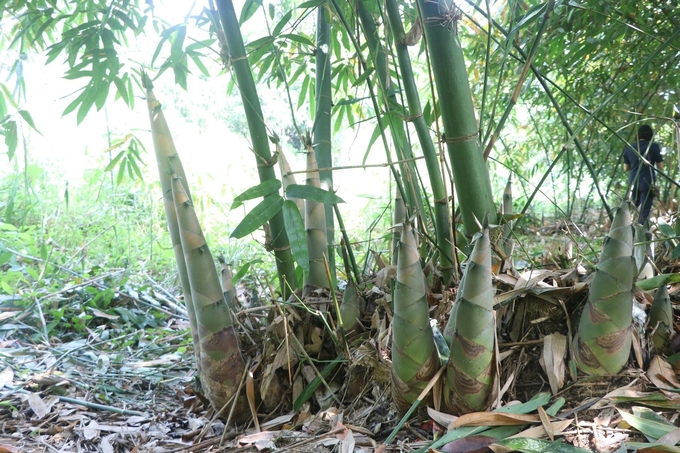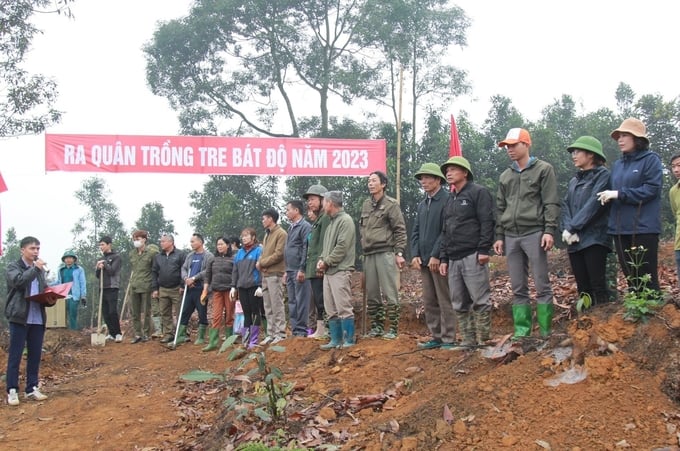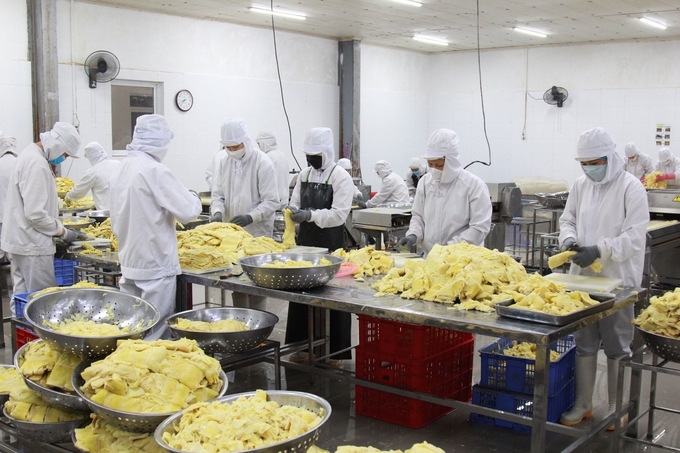May 29, 2025 | 15:50 GMT +7
May 29, 2025 | 15:50 GMT +7
Hotline: 0913.378.918
May 29, 2025 | 15:50 GMT +7
Hotline: 0913.378.918
Tran Yen district (Yen Bai) is currently continuing to strive to expand the Bat Do bamboo growing area. In addition, continue to form close linkages with purchasing and processing businesses and facilities to increase income for farmers. The Bat Do bamboo shoot product is now not only consumed in the domestic market but also processed and exported to many countries around the world, such as Japan and Taiwan.

After 20 years of development, Bat Do bamboo has become a major crop, bringing high and sustainable economic efficiency to Tran Yen district (Yen Bai province). Photo: Thanh Tien.
Ms. Tran Thi Hoan Lien, Director of the Support Services and Agricultural Development Center and Deputy Management Board of the Bat Do Bamboo Program in Tran Yen district, said that “The Bat Do bamboo shoot program in the district has been developing stably and sustainably over the past 20 years. In 2002, Yen Bai province had a guideline to develop Bat Do bamboo shoots in the two districts of Yen Binh and Tran Yen.”
Bat Do bamboo shoots were first planted in Tran Yen district in 2003, covering the entire district’s area of 60 hectares. The Party Committee and government of Tran Yen district set a goal of creating a raw material area of 1,000 hectares and creating a large commodity product to sell to the market for the period 2005–2010.
Bat Do bamboo planted in Tran Yen produces a lot of bamboo shoots because of its strange tree type, good soil, and suitable climate. However, in the period 2005–2006, finding an output for bamboo shoots was extremely difficult. Faced with the risk of having products without a place to sell them, the district has struggled to find consumption markets and processing businesses.
The Management Board of the district’s Bat Do Bamboo Program had to set up a working delegation to go to provinces such as Hanoi, Hoa Binh, Hai Duong, Ha Giang, etc. to find businesses to purchase the bamboo shoot product. Up to now, many businesses have come to the district to purchase products and link production with people and cooperatives. The bamboo shoot purchasing network is widely distributed throughout the raw material area. Thanks to that, the value of commercial Bat Do bamboo shoots is increasing, helping highland people feel secure in sticking with them and expanding their area.

Every year, Tran Yen district organizes a Bat Do bamboo planting kick-off ceremony to encourage people to expand their area. Photo: Thanh Tien.
As of now, after 20 years, Tran Yen district has confirmed that Bat Do bamboo shoots are the major crop. By 2025, the district strives to maintain and develop the Bat Do bamboo shoot raw material area of over 4,000 hectares, with an annual harvest output of 40,000 tons. In addition, Tran Yen also focuses on linking production according to the value chain associated with sustainable product consumption.
Realizing high and stable economic efficiency, in recent years, farmers in highland communes of Tran Yen district, such as Kien Thanh, Hong Ca, Hung Khanh, Luong Thinh, Viet Hong, etc., have continued to expand the Bat Do bamboo area. Currently, a Bat Do bamboo growing area of over 4,200 hectares has been formed in Tran Yen district. From a strange and new crop, up until now, Bat Do bamboo has become the crop bringing major commodity products to the locality. From struggling to find an output for the bamboo shoot product, this product is now not only consumed well in the domestic market but has been exported to many countries.
Yen Thanh Joint Stock Company is one of the pioneering enterprises and has been attached to the Bat Do bamboo raw material area since the early years of development. Currently, the company has built a factory to purchase and process fresh bamboo shoots for export to the Japanese market. Each year, the company exports 2,000–2,500 tons of bamboo shoot products.

The Bat Do bamboo shoot product, after processing, has met the strict requirements of Japanese and Taiwanese markets. Photo: Thanh Tien.
Mr. Nguyen Duc Dung, Director of Yen Thanh Joint Stock Company, said that at the first stage, the company formed production linkage chains from farmers to businesses, mainly of a spontaneous nature. In recent years, when Resolution 69 of the Yen Bai Provincial People's Council specializing in the development of agricultural and forestry commodity production along the value chain was issued, Yen Thanh Joint Stock Company built more sustainable and stable production linkage chains. Specifically, bamboo growers sign with purchasing cooperatives, and businesses purchase products from cooperatives.
"Our company is the first unit in the chain to consume and process products for exports. In addition, the company also advises and supports cooperatives with the knowledge to continue to expand and develop Bat Do bamboo shoot raw material areas; invests capital, materials, seedlings, and techniques for farmers to improve the quality of raw material areas," said Mr. Nguyen Duc Dung.
According to Mr. Dung, the demand for clean and environmentally friendly food is increasing, especially in countries with developed economic conditions. The raw material source for Bat Do bamboo shoot products in Tran Yen district in particular and in Yen Bai province in general can only meet a very small part of the world market. Therefore, Yen Bai province needs to have orientation and planning to continue expanding the area of raw material areas in localities that still have a lot of hill and forest land and have suitable soil and climate conditions.
Bat Do bamboo shoot products from Tran Yen district are consumed very well in the Yen Bai market in particular and across the country in general. Especially, the market for bamboo shoot products is currently very sustainable and open in developed countries such as Japan, Taiwan, Korea, and some other Asian and European countries. Bat Do bamboo shoots are favored because they are large in weight, crunchy, fragrant, sweet, and easy to prepare, especially since this is a clean product produced organically.
Translated by Huyen Vu Thu

(VAN) FAO’s Director-General addresses the 5th Baghdad International Water Conference.
/2025/05/26/1716-4-nongnghiep-191706.jpg)
(VAN) Chain linkages, technological innovation, and raw material zoning are three strategic pillars for the coconut industry to strongly develop and elevate its position on the global agricultural map.
![Advanced mariculture – an inevitable trend: [4] Accompanied by scientists](https://t.ex-cdn.com/nongnghiepmoitruong.vn/608w/files/sohk/2025/05/13/1941-pgsts-vo-van-nha-140958_717.jpg)
(VAN) According to Assoc. Prof. Dr. Vo Van Nha, Director of the RIA III, the development of advanced offshore mariculture is no longer an option but an essential path for Vietnam’s fisheries sector.

(VAN) Vietnam is intensifying the development of mollusk farming areas that meet international standards, aiming for sustainable growth and enhancing its export position in the global seafood market.
![Advanced mariculture – an inevitable trend: [3] Policy-driven momentum](https://t.ex-cdn.com/nongnghiepmoitruong.vn/608w/files/doanhtq/2025/05/21/0104-0616-0348-nuoi-bien-170339_789.jpg)
(VAN) To ensure the success of offshore mariculture that uses advanced technologies, it is essential to establish supportive policies that inspire both individuals and enterprises to invest with confidence.
![Advanced mariculture – an inevitable trend: [2] Outstanding results](https://t.ex-cdn.com/nongnghiepmoitruong.vn/608w/files/sohk/2025/05/12/4632-4136-nuoi-bien-11-164117_819.jpg)
(VAN) Pilot models of high-tech offshore mariculture in Vietnam, particularly in the South Central Coast region, have demonstrated exceptional economic returns and sustainability, setting a new direction for the country’s aquaculture industry.
![Advanced mariculture – an inevitable trend: [1] Moving offshore](https://t.ex-cdn.com/nongnghiepmoitruong.vn/608w/files/phucpm/2025/05/18/0252-2436-nuoi-bien-6-162148_783.jpg)
(VAN) Mariculture using advanced technology and moving offshore is an inevitable trend, as nearshore areas increasingly reveal limitations.